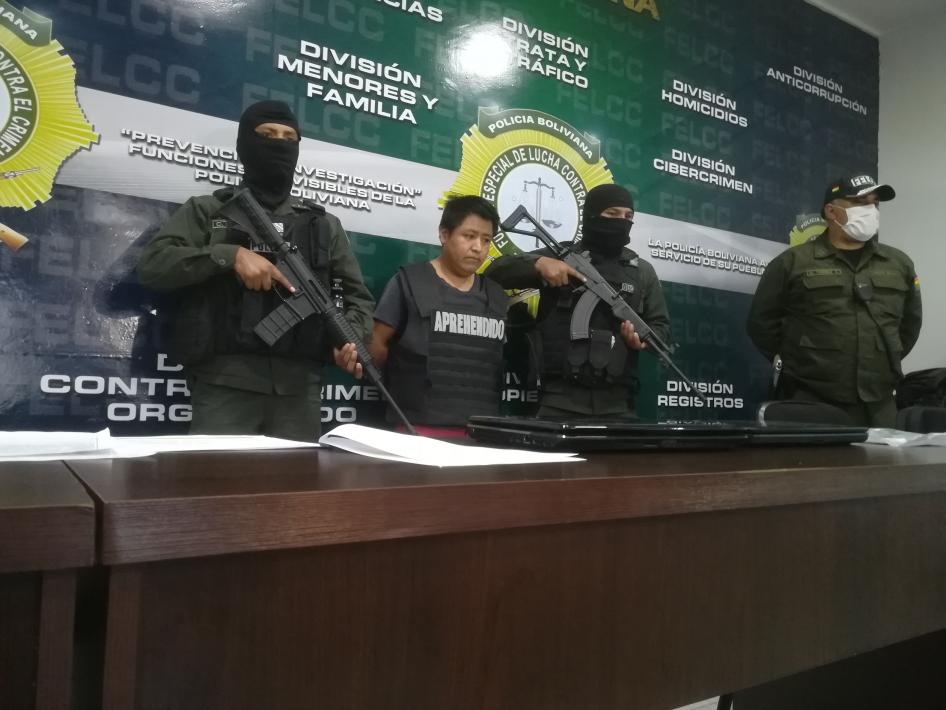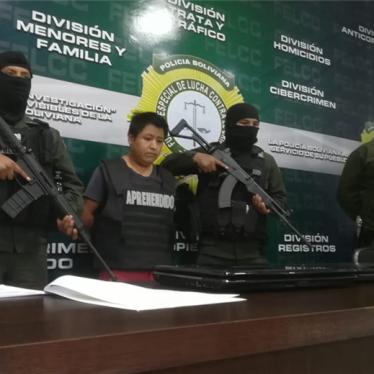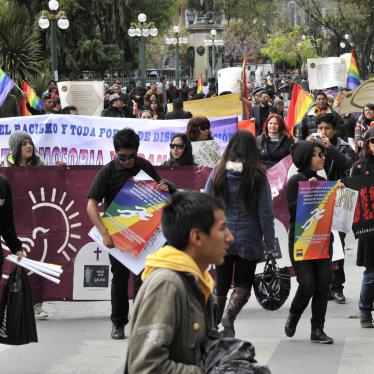(Washington, DC) – The interim government of Bolivia is abusing the justice system to persecute associates and supporters of former president Evo Morales, who himself faces terrorism charges that appear to be politically motivated, Human Rights Watch said in a report released today.
The 47-page report, “Justice as a Weapon: Political Persecution in Bolivia,” documents instances of baseless or disproportionate charges, due process violations, infringement of freedom of expression, and excessive and arbitrary use of pretrial detention in cases pursued by the interim government. Human Rights Watch also found examples of abuse of the justice system against Morales opponents during the Morales administration.
“Prosecutors can and should investigate if they have credible information that anyone, including former government officials, has committed a crime,” said José Miguel Vivanco, Americas director at Human Rights Watch. “But it is crucial for justice officials to operate independently and respect basic rights, not to serve as a tool to persecute the political opponents of whatever administration is in power.”
Morales was forced to resign in November 2019 and fled the country amid nationwide protests sparked by allegations of electoral fraud – now disputed – and after the commanders of the armed forces and the police asked him to step down.
Jeanine Áñez, a former senator who became interim president, had a chance to break with the past and ensure judicial independence. Instead, her government has publicly pressured prosecutors and judges to further its interests, leading to criminal investigations of more than 100 people linked to the Morales administration and Morales supporters for alleged sedition or terrorism. Scores more are under criminal investigation for allegedly belonging to a criminal organization, dereliction of duty, and other crimes. Many of the cases appear to be politically motivated.
Human Rights Watch examined thousands of court documents and police reports in 21 of those cases, and, in February 2020, had access to the full file of the terrorism investigation against Morales, consisting of more than 1,500 pages. Human Rights Watch also interviewed 90 people, including Interior Minister Arturo Murillo, Ombudsperson Nadia Cruz, prosecutors, defense attorneys, participants in roadblocks and demonstrations – both for and against Morales – witnesses to violence, and relatives of protesters who were killed.
Prosecutors charged some people with terrorism merely for having phone contact with Morales, Human Rights Watch found. Others have been charged with crimes for exercising their freedom of expression by criticizing the government online.
The report describes the following three cases, among others:
- Prosecutors charged Patricia Hermosa, Morales’ attorney and former chief of staff, with terrorism, financing of terrorism, and sedition based solely on her having telephone contact with Morales after he had resigned. She was arrested on January 31, 2020 and was held in pretrial detention until August 5 without access to medical care while pregnant. She had a miscarriage in March.
- Prosecutors charged a Morales supporter, Mauricio Jara, with sedition, instigation to commit a crime, and crimes against public health, apparently based on his exercise of free speech. As evidence of his criminal activity, police alleged that Jara had called the government “a tyrant” and “dictatorial,” had called the November 2019 killing of at least 10 protesters in Senkata a “massacre,” had “misinformed” others, and had urged people to protest. He is currently being held in pretrial detention.
- Following Bolivian laws that formally discourage pretrial detention, judge Hugo Huacani granted house arrest to Edith Chávez, a maid for a former Morales administration official whose case is also featured in the report. Hours later, two government lawyers reported the judge to the police for a possible “lack of independence.” Police detained the judge and held him until the next day, when another judge ruled that his arrest had been illegal. The Interior Ministry filed a criminal complaint against Judge Huacani for alleged dereliction of duty and for issuing decisions that violate the law.
Morales, who is in exile in Argentina, has been charged with terrorism and financing of terrorism, each punishable by up to 20 years in prison. Morales is also facing criminal investigation in other cases, though charges have not yet been filed in them.
The terrorism charges against Morales are based on a November 2019 phone call, made days after Morales left office, in which a person alleged to be Morales urged an associate to mobilize protesters to block roads into cities and prevent food from entering. The person says they must “fight, fight, fight,” and vows to “wage a hard battle against the dictatorship.”
Protesters in Bolivia often use the terms “fight” and “battle” to refer to their demonstrations. Blocking roads is also a common means of protest in Bolivia and other countries in the region. Both anti- and pro-Morales protesters blocked roads during the upheaval in October and November. After Morales resigned on November 10, his supporters intensified their protests, blocking main roads and causing fuel and food shortages that resulted in price spikes in some areas.
While most protests were peaceful, some anti- and pro-Morales demonstrators allegedly abducted people identified as supporting the other side, burned homes and other buildings, and committed other acts of violence, including the killing of two anti-Morales protesters in the town of Montero by alleged Morales supporters.
In the recorded conversation, which allegedly took place on November 14 – after these violent incidents – the speakers do not overtly discuss the use of violence or participation in any of the violent acts that had occurred.
Prosecutors allege that Morales ordered acts of violence, but the evidence Human Rights Watch reviewed – primarily consisting of the one phone call – simply does not support such allegations.
“The statements attributed to Morales raise serious concerns, and it is reasonable for prosecutors to investigate whether they constitute a crime under Bolivian law,” Vivanco said. “But using Bolivia’s overbroad terrorism law to seek a 20-year prison sentence against Morales is wholly disproportionate to the conduct reflected in the phone call and appears to be a political attack on Morales and his supporters.”







